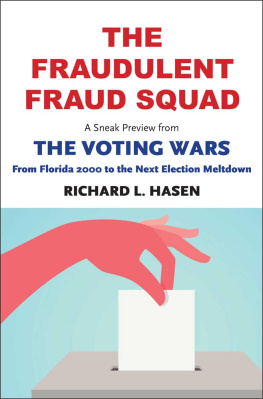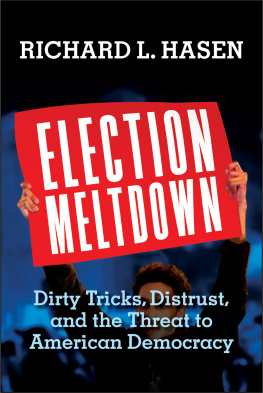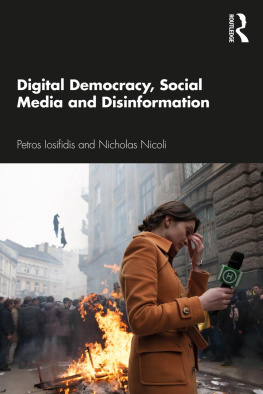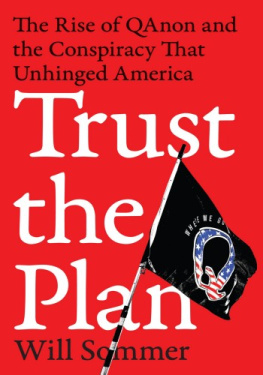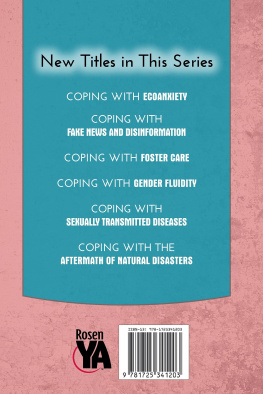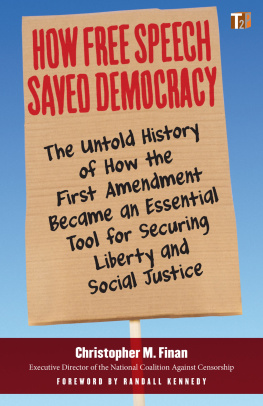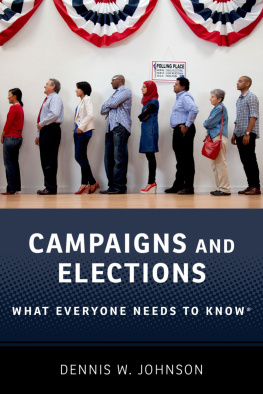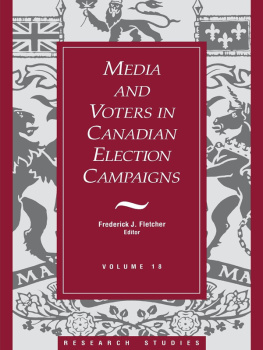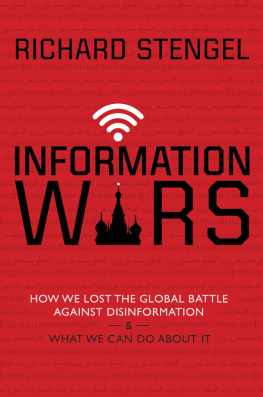Cheap Speech
CHEAP SPEECH
HOW DISINFORMATION POISONS OUR POLITICSAND HOW TO CURE IT

RICHARD L. HASEN

Published with assistance from the Mary Cady Tew Memorial Fund.
Copyright 2022 by Richard L. Hasen. All rights reserved. This book may not be reproduced, in whole or in part, including illustrations, in any form (beyond that copying permitted by Sections 107 and 108 of the U.S. Copyright Law and except by reviewers for the public press), without written permission from the publishers.
Yale University Press books may be purchased in quantity for educational, business, or promotional use. For information, please e-mail (U.K. office).
Set in Gotham & Adobe Garamond type by
Integrated Publishing Solutions.
Library of Congress Control Number: 2021944800
ISBN 978-0-300-25937-7 (hardcover : alk. paper)
A catalogue record for this book is available from the British Library.
This paper meets the requirements of ANSI/NISO Z39.48-1992 (Permanence of Paper).
For the Heroes
Who Were Injured Defending the U.S. Capitol during the January 6, 2021, Insurrection and Who Assured
We Had a Fair and Safe 2020 Presidential Election
Contents
Acknowledgments
I began exploring the ideas in this book at a symposium, Distorting the Truth: Fake News and Free Speech, held by the First Amendment Law Review at the University of North Carolina School of Law on October 27, 2017. I further developed the ideas delivering the Richard J. Childress Memorial Lecture at St. Louis University School of Law on October 11, 2019, a part of a symposium titled American Election Law in a Post-Truth World. Events of January 6, 2021, at the U.S. Capitol unfortunately verified many of the fears I expressed in those earlier writings.
I then received a leave in fall 2020 to complete work on the book thanks to the very generous support of the John S. and James L. Knight Foundation and Craig Newmark Philanthropies. Additional support for research came from the University of California, Irvine, School of Law.
As always, I benefited greatly from the expertise and wisdom of symposium participants and of generous readers of both those original articles and this current draft. I thank the following people who provided very useful comments and suggestions: Floyd Abrams, Bob Bauer, Joe Birkenstock, Ted Boutrous, Bruce Cain, Anupam Chander, Guy Charles, Erwin Chemerinsky, Bobby Chesney, Danielle Citron, Julie Cohen, Ron Collins, evelyn douek, David Ettinger, Chad Flanders, Ned Foley, Howard Gillman, Rebecca Green, Sarah Haan, Daniel Hemel, Steve Kay, David Kaye, Justin Levitt, Michael Morley, Derek Muller, Brendan Nyhan, Norm Ornstein, Nate Persily, Rick Pildes, Ann Ravel, Charlotte Stanton, Brad Smith, Dan Tokaji, Eugene Volokh, and Sonja West. Thanks also to my University of California, Irvine, colleagues who participated in a faculty workshop, as well as colleagues at the Georgetown University Law Center who participated in a workshop when I was a visitor. Thanks as well to the anonymous reader for Yale University Press. Although the book is much improved thanks to these comments, I take full responsibility for remaining errors.
Thanks to Bill Frucht of Yale University Press, whose judgment and editing skills are second to none, to Karen Olson at the Press for help with all manner of logistical issues, to Margaret Otzel and Ann Twombly for excellent production assistance, and to my agent, Melissa Flashman, whose smarts and initiative helped bring this book to life.
University of California, Irvine, School of Law Dean Song Richardson ensured that I had all the resources I needed to complete this project, and she provided enthusiastic encouragement all along the way. Thanks as well to Mary Ann Soden and Dennis Slon, who assisted in obtaining the financial support for this work.
Hannah Bartlett, Kayley Berger, Julia Jones, and Anna Setyaeva provided excellent research assistance. Stacy Tran provided professional and terrific administrative assistance. Erin Hiebert assisted in the preparation of this books illustrations, and Ellen Augustiniak, Jeff Latta, Dianna Sahhar, and Christina Tsou provided first-rate library support.
Most of all, I thank my wife, Lori Klein, for her unwavering support, sage advice, love, and patience.
I gratefully acknowledge permission to reprint parts of these works:
Cheap Speech and What It Has Done (To American Democracy), 16 First Amendment Law Review 200 (2018)
Deep Fakes, Bots, and Siloed Justices: American Election Law in a Post-Truth World, 64 St. Louis University Law Journal 535 (2020)
Election Meltdown: Dirty Tricks, Distrust, and the Threat to American Democracy 7580, 8387 (Yale University Press 2020)
Thanks to Thomas Kennedy for permission to republish his tweet about mailboxes in Wisconsin and to Bruce Mittlesteadt for permission to republish his photograph of the mailboxes that appears in the tweet. And thanks to Matthew Mulligan for assisting in determining the origin of the photograph.
Rick Hasen
Studio City, California
June 2021
Cheap Speech
Clear and Present Danger
The greatest spreader of election disinformation in the 2020 U.S. presidential election season was not a group of Russian hackers operating out of a boiler room in St. Petersburg or a shady political operative deploying anonymous Twitter bots. It was the president of the United States, Donald J. Trump.
Trumps spreading over social media of the Big Lie that he had won an election he actually had lost decisively to Joe Biden led to the January 6, 2021, invasion of the U.S. Capitol and violent insurrection by Trump supporters just as Congress was in the middle of confirming Bidens victory in the Electoral College. The invasion put the lives of Vice President Mike Pence and the congressional leadership in danger, and it left 4 Trump supporters dead and 146 law enforcement officers injured. One officer died of apparent natural causes a day after being sprayed with chemicals by protesters, two died by suicide shortly after the insurrection, and two more died by suicide by mid-August 2021. A slightly more successful operation causing the death of American political leadership could have resulted in political upheaval, led to possible military intervention in the transfer of power, and brought down American democracy itself.
Hours later, after D.C. police and the National Guard helped restore order, Congress resumed the vote counting. Despite the melee demonstrating the real-world danger of the Big Lie, 138 Republican House members and 7 Republican senators nonetheless voted to ob
The 2020 election season was nothing short of bizarre. It was held during the COVID-19 pandemic, in which tens of millions of Americans voted by mail to avoid unnecessary personal contact with others who could infect them. The massive shift to remote balloting demanded a Herculean effort among election administrators, a major public service campaign to ensure that voters knew how to fill out their ballots accurately and return them on time, and hundreds of millions of dollars in private philanthropic funding (including $350 million from Facebooks Mark Zuckerberg) to keep the election system afloat.
In the summer, when the pandemic had claimed about 150,000 American lives, Trump repeatedly blasted out to his 84 million Twitter followers (and to millions more on Facebook and other forms of social media) false statements about the fairness and security of voting by maila method that has been employed since the Civil War and that he, his family, and his associates have regularly used in past elections. Trump even voted by mail in the 2020 primaries, using a third party to return his ballot to Florida election officials (a form of ballot harvesting he railed against).
Next page

